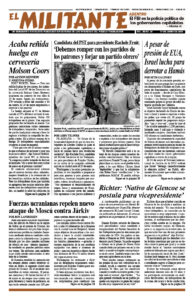Puerto Rico: Independence Is a Necessity by Rafael Cancel Miranda is one of Pathfinder’s Books of the Month for June. Rachele Fruit, the Socialist Workers Party candidate for president, will be representing the party, speaking before the U.N. commission on decolonization hearing on Puerto Rico June 20. Cancel Miranda was one of five Puerto Rican Nationalists imprisoned by Washington for more than 25 years following armed protests they carried out in the U.S. Capitol against colonial rule. Freed from prison in 1979 after an international defense campaign, he continued to speak out on the brutal reality of U.S. colonial domination, campaigning to free other Puerto Rican political prisoners and explaining the example of Cuba’s socialist revolution. Copyright © 1998 by Pathfinder Press. Reprinted by permission.
U.S. imperialism controls our country socially, politically, and economically. We are a militarily occupied country — we’re saturated by U.S. military bases. Now they want to transfer the U.S. Southern Command here from Panama.
They control the mass media. They control our schools. They indoctrinate us from the time we’re children. They tell you who to hate and who not to hate. They can even indoctrinate you to hate yourself. …
We have to reach out to the greatest number of our people with the truth and the need for independence. Independence is not simply a nice ideal. It is a necessity.
We have to reach the new generations, so they will continue the struggle until the time comes when different forces in the world come together and strengthen our struggle. We are part of the world, and what happens all over the world affects our country.
The United States uses our young people as cannon fodder in their wars. In the Vietnam War, Puerto Rico had a disproportionately high number of casualties relative to its population compared to the United States. The same thing happened in the Korean War.
They sent us to kill Dominicans in the Dominican Republic in 1965. When they invaded Panama in 1989, they sent us to kill Panamanians, who are our brothers and sisters.
Before the Gulf War, nobody here knew who Saddam Hussein was. But in one week they got the Puerto Rican people to hate Saddam Hussein, through their control of the media, and then everyone was saying that Saddam was the devil.
I asked on the radio the other day, “What are Puerto Ricans doing in Bosnia?” If Rockefeller wants to send his sons to fight in Bosnia, let him do it. But he’s not going to send his sons to Bosnia. He’s going to send your sons, the sons of John Doe and Mary Jane.
So young people are affected by this colonial reality.
We have to show workers why independence is in their interests as workers: so they can be the owners of their country and their factories, so they can be the owners of what they produce. So that everything doesn’t end up in the coffers of Wall Street. So that it stays here for their development. …
We Nationalists say: first, transfer all powers to the Puerto Rican people. Demilitarize our country. Remove all U.S. military bases and repressive agencies from Puerto Rico, and then we’ll decide. Then we can talk.
Our people enjoyed a few months of freedom during the transfer of power between Spain and the United States. In 1897 we won a measure of autonomy, after many years of struggle. We had our own postage stamps, our own Puerto Rican currency, our own parliament, our own Customs. We had control over our own foreign trade; we sold to whomever we wished. When the U.S. invaded in 1898, that came to an end.
This struggle is difficult for a people that has been colonized for so many years, because colonial rule is like alcoholism or worse. As hard as it is to detoxify yourself from alcoholism, it’s even harder to detoxify yourself from a colonial mindset, because you have to get rid of so many lies and complexes that they’ve drilled into your head. …
We weren’t freed from prison because suddenly the U.S. government, like St. Paul, saw the light. They freed us from prison because of international pressure.
We were the only prisoners in U.S. penal history who came out of jail setting conditions on the jailers, rather than the jailers imposing conditions on us. Anyone can get out of prison. What counts isn’t going to prison or getting out of prison. It’s why you go in and how you come out. …
But it was a victory. We came out standing on our feet.
That was thanks to the struggle waged by other people, including the Militant, which wrote articles on our behalf. …
Under the system that exists in Cuba, your worth is determined by what you are. And when I talk about the system in Cuba, I’m talking about the socialist system. Your worth is measured by how you share with others. Under this system your worth is measured by what you own, and they keep us at war with each other.
For me, Cuba dignifies people, it humanizes people. This system dehumanizes people. It’s dog-eat-dog. That’s the philosophy. And they keep indoctrinating you in order to strip you of your human values. They keep instilling money-grubbing values so you will serve them better as a tool and to make you accept degradation and humiliation because they’ve taken away your values. Only people who have values are capable of feeling indignation and anger.
I was always a nationalist and defender of my country. But I’m a nationalist because I’m a socialist. And I’m a socialist because I’m a nationalist. I believe in socialism for my country because I want the best for my country and for the world. …
I believe in socialism as much as I believe in independence for my country. I wouldn’t want a free country — with all we have sacrificed throughout our history of struggle — so that two or three parasites could take over the lives of our people, could enrich themselves at the expense of our people. I don’t want that kind of independence.


